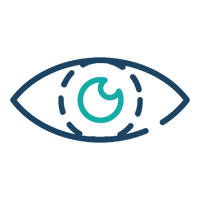Eyesight is one of the most important senses we have, in fact over 80% of the information that we take in is processed through our visual system. Therefore, it is really important to take good care of our eyes and make sure that they are in good health. An annual comprehensive eye exam is much more than updating your prescriptions for glasses or contact lenses, it is a preventative health examination that ensures that your vision stays healthy as you age.
What tests are included in a routine eye exam?
When a patient comes in for an eye exam, an optometrist examines the following aspects of vision:
- Eye exams begin by checking a patient's visual acuity, which examines how well they can see
- Their ability to see far away and up close
- The eye doctor examines the muscles in the patient's eyes, to see if the muscles are working well
- They check the patient’s pupils
- Patients' eyes are tested to see how well they respond to light
- Are the pupils properly constricting and dilating when a light is shined into the patient’s eyes?
- They test the patient's binocularity, looking at how well the two eyes work together.
- They look for any type of deviations in the eyes
- They examine the patient’s eyes to see if they are turning in, out, up or down
- Does the patient have difficulty focusing on a moving target when their eyes are turned inward, and if so, what is causing them difficulty?
- They check patient’s depth perception and 3d vision
- The patient's peripheral vision is screened to make sure that their side vision is intact, and that there are no gross defects.
- They also perform a refraction test, which involves putting the patient behind a phoropter.
- The doctor will examine the patient’s vision to find out if they need glasses, or if they have minus or plus prescription
- Furthermore, they check if the patient has any astigmatism
- They then look at the patient's eye health using a microscope, and then they look at the front part of the eye to see if everything is okay.
- Additionally, they measure the patient's eye pressure. A basic glaucoma screening is to ensure that the patient's eye pressure is not too high since glaucoma is usually associated with high eye pressure.
- It is also important to dilate the patient's eyes so that they can then examine the back of the eye. It may be possible to get 20/20 vision from the front part of the eye, so it is important to ensure the back part of the eye is as healthy as the front.
- By shining lights into the patient's eyes, they examine the periphery of the back part of the patient's eye.
- It is important to check the optic nerves, which connect the eye and brain, to make sure they are healthy.
What are the possible outcomes of the eye exam?
The doctor will discuss everything with you. They will then determine what your next course of treatment should be based on their findings. Even if your vision seems perfectly normal to you, they need to monitor you every year (or more frequently if you have any signs of ocular disease). They may need to see you sooner depending on the results, however.
- In the event that you have dry eyes, the doctor may ask you to come back for some dry eye imaging and specific dry eye testing, and determine what the next step in your treatment needs to be.
- You will need to return for extra testing such as a sensorimotor evaluation or perceptual vision evaluation if you have some sort of binocularity issue, tracking issues, problems with fixation, or issues with processing visual information.
- A myopia management consultation may be required for children and teenagers who have a minus prescription and there is concern about the prescription becoming higher.
- Any ocular disease, like glaucoma, will cause them to recommend further testing, imaging, and a closer look at your optic nerves. At our office we provide advanced testing such as OCT (ocular coherence tomography) and ERG (electroretinography).
Schedule an eye exam today
Annual comprehensive eye exams are very important, so make sure you schedule one. When you have ocular eye conditions, it's essential that your eye doctor detects and manages the condition early, since the earlier they catch certain conditions, the better the prognosis will be. For example, certain diseases such as glaucoma, diabetic retinopathy and macular degeneration have a much greater chance of progressing to the more severe forms which can result in irreversible vision loss, if not caught early .It's crucial to visit your eye doctor at least once a year for a comprehensive eye exam so that they can examine your eyes properly and ensure they stay healthy.











